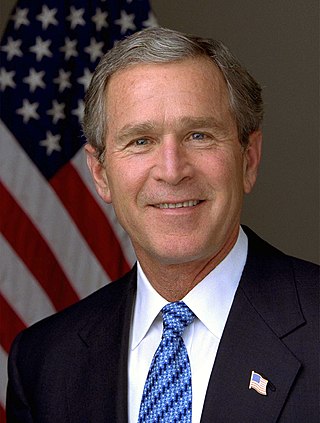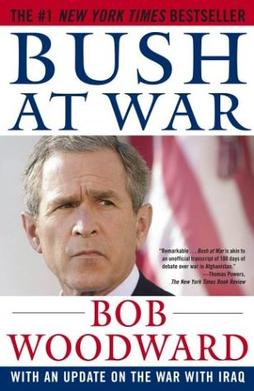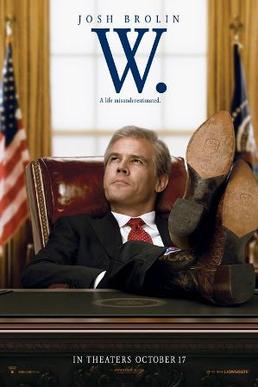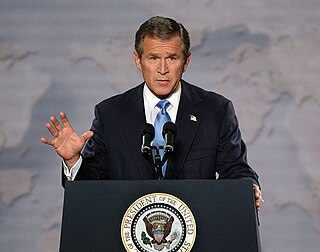
Donald Henry Rumsfeld was an American politician, government official and businessman who served as secretary of defense from 1975 to 1977 under President Gerald Ford, and again from 2001 to 2006 under President George W. Bush. He was both the youngest and the oldest secretary of defense. Additionally, Rumsfeld was a four-term U.S. Congressman from Illinois (1963–1969), director of the Office of Economic Opportunity (1969–1970), counselor to the president (1969–1973), the U.S. Representative to NATO (1973–1974), and the White House Chief of Staff (1974–1975). Between his terms as secretary of defense, he served as the CEO and chairman of several companies.

Condoleezza "Condi" Rice is an American diplomat and political scientist serving since 2020 as the 8th director of Stanford University's Hoover Institution. A member of the Republican Party, she previously served as the 66th United States secretary of state from 2005 to 2009 and as the 19th U.S. national security advisor from 2001 to 2005. Rice was the first female African-American secretary of state and the first woman to serve as national security advisor. Until the election of Barack Obama as president in 2008, Rice and her predecessor, Colin Powell, were the highest-ranking African Americans in the history of the federal executive branch. At the time of her appointment as Secretary of State, Rice was the highest-ranking woman in the history of the United States to be in the presidential line of succession.

George W. Bush's tenure as the 43rd president of the United States began with his first inauguration on January 20, 2001, and ended on January 20, 2009. Bush, a Republican from Texas, took office following his narrow electoral college victory over Democratic incumbent vice president Al Gore in the 2000 presidential election, in which he lost the popular vote to Gore by 543,895 votes. Four years later, in the 2004 presidential election, he narrowly defeated Democrat nominee John Kerry, to win re-election and winning both the popular and the electoral college vote. Bush served two terms and was succeeded by Democrat Barack Obama, who won the 2008 presidential election. He is the eldest son of the 41st president, George H. W. Bush.

George John Tenet is an American intelligence official and academic who served as the Director of Central Intelligence (DCI) for the United States Central Intelligence Agency, as well as a Distinguished Professor in the Practice of Diplomacy at Georgetown University.

Against All Enemies: Inside America's War on Terror (ISBN 0-7432-6823-7) is a 2004 award-winning book by former U.S. chief counter-terrorism advisor Richard A. Clarke, criticizing past and present presidential administrations for the way they handled the War on Terrorism. The book focused much of its criticism on President George W. Bush, charging that he failed to take sufficient action to protect the country in the elevated-threat period before the September 11 attacks and for the 2003 invasion of Iraq, which Clarke feels greatly hampered the War on Terrorism. The book's title comes from the oath of office taken by all U.S. federal officials, in which they promise to defend the Constitution "against all enemies, foreign and domestic."
Stuff Happens is a play by David Hare, written in response to the Iraq War. Hare describes it as "a history play" that deals with recent history. The title is inspired by Donald Rumsfeld's response to widespread looting in Baghdad: "Stuff happens and it’s untidy, and freedom’s untidy, and free people are free to make mistakes and commit crimes and do bad things.”
The following lists events in the year 2003 in Iraq.

The Saddam Hussein and al-Qaeda link allegations were based on false claims by the United States government alleging that a secretive relationship existed between Iraqi president Saddam Hussein and the Sunni pan-Islamist militant organization al-Qaeda between 1992 and 2003. U.S. president George W. Bush used it as a main reason for invading Iraq in 2003.

Bush at War is a 2002 book by The Washington Post reporter Bob Woodward recounting President George W. Bush's responses to the September 11 attacks and his administration's handling of the subsequent War in Afghanistan.

The White House Iraq Group was a working group of the White House set up in August 2002 and tasked with disseminating information supporting the positions of the George W. Bush administration relating to a possible invasion of Iraq, which would subsequently take place in March 2003.

Lawrence B.Wilkerson is a retired United States Army Colonel and former chief of staff to United States Secretary of State Colin Powell.

There are various rationales for the Iraq War that have been used to justify the 2003 invasion of Iraq and subsequent hostilities.

State of Denial: Bush at War, Part III (ISBN 0-7432-7223-4) is a 2006 book by Bob Woodward that examines how the George W. Bush administration managed the Iraq War after the 2003 invasion. It follows Woodward's previous books on the Bush administration, Bush at War and Plan of Attack. Based on interviews with a number of people in the Bush administration, the book makes a number of allegations about the administration.

At the Center of the Storm: My Years at the CIA is a memoir co-written by former Director of the Central Intelligence Agency George Tenet with Bill Harlow, former CIA Director of Public Affairs. The book was released on April 30, 2007 and outlines Tenet's version of 9/11, the War on Terrorism, the 2001 War in Afghanistan, the run-up to the 2003 Iraq war, rough interrogation and other events.

W. is a 2008 American biographical comedy-drama film based on the life of George W. Bush. Directed by Oliver Stone and written by Stanley Weiser, it stars Josh Brolin as Bush. The supporting cast includes Elizabeth Banks, James Cromwell, Ellen Burstyn, Thandiwe Newton, Jeffrey Wright, Scott Glenn, and Richard Dreyfuss. Filming began on May 12, 2008, in Louisiana, and the film was released on October 17, 2008.
Coalition Provisional Authority Order Number 2: Dissolution of Entities signed by Paul Bremer on behalf of the Coalition Provisional Authority on 23 May 2003, disbanded the Iraqi military, security, and intelligence infrastructure of President Saddam Hussein. It has since become an object of controversy, cited by some critics as the biggest American mistake made in the immediate aftermath of the fall of Saddam Hussein and as one of the main causes of the rise of the Islamic State of Iraq and the Levant (ISIL/ISIS).

Prior to the Iraq War, the United States accused Iraq of developing weapons of mass destruction and having links with al-Qaeda. In 1991, the United Nations Security Council Resolution 687 was adopted and subsequent UN weapons inspectors were inside Iraq. This period also saw low-level hostilities between Iraq and the United States-led coalition from 1991–2003.

Decision Points is a memoir by former U.S. President George W. Bush. It was released on November 9, 2010, and the release was accompanied by national television appearances and a national tour. The book surpassed sales of two million copies less than two months after its release, breaking the record previously held by former President Bill Clinton's memoir My Life. Decision Points also opened at #1 on the New York Times bestseller list.

Known and Unknown: A Memoir is an autobiographical book by Donald Rumsfeld published through Penguin Group USA in February 2011. It covers a variety of his experiences such as serving as a member of the United States House of Representatives in the late 60s, as a member of the Nixon and Ford administrations during the Watergate scandal and Vietnam War, and as George W. Bush's Secretary of Defense at the onset of the War on Terror.

In My Time: A Personal and Political Memoir is a memoir written by former Vice President of the United States Dick Cheney with Liz Cheney. The book was released on August 30, 2011, and outlines Cheney's accounts of 9/11, the War on Terrorism, the 2001 War in Afghanistan, the run-up to the 2003 Iraq war, enhanced interrogation techniques and other events. According to Barton Gellman, the author of Angler: The Cheney Vice Presidency, Cheney's book differs from publicly available records on details surrounding the NSA surveillance program. Cheney discusses his both good and bad interactions with his peers during the Presidency of George W. Bush.

















